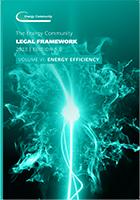Energy efficiency as cross-sectoral issue asks for extensive cooperation and coordination on national and regional level toward achievement of the Energy Community Decarbonisation Roadmap, transposition of Clean Energy Package and achievement of 2030 energy and climate targets adopted by the Ministerial Council in December 2022.
The Energy Efficiency Coordination Group (EECG) is a regional coordination platform that steers the implementation of the Energy Community energy efficiency acquis. It contributes to the transposition and/or implementation of current energy efficiency acquis, including the Clean Energy Package and follow developments in EU. The planned revisions of Energy Efficiency Directive and Buildings Directive in EU need to be carefully analysed, adapted and incorporated in the Energy Community legal framework.
The Group meets generally three times per year. It evolved from a Task Force to a Coordination Group with a mandate granted for an unlimited period of time due to the challenges ahead. The Energy Efficiency Task Force was the first task force to be established by the Ministerial Council in 2007 (3rd MC conclusions).
-
Tasks and composition
Tasks, and composition
The Group brings together representatives of
- ministries and agencies in charge of energy efficiency from Contracting Parties and Observer countries;
- the European Commission; and,
- the donors community
- the donors community (European Bank for Reconstruction and Development, World Bank, European Investment Bank, KfW, GIZ, USAID, EU4ENERGY, etc.).
The key task of the Energy Efficiency Coordination Group (EECG) is to facilitate the transposition of energy efficiency acquis into national legislation and support their effective implementation in practice. In parallel, the EECG plays an important role as an initiator, coordinator and implementation partner of diverse regional technical assistance and investment programmes.
Filters:
Document Name Published on 06.08.2022- Work Programme
Work Programme
The EECG Work Programme 2023-2024 includes ten expert areas grouped in four chapters:
- Implementation of the Energy Efficiency Directive, including the new amending Directive (EU) 2018/2002, adopted by the Energy Community in November 2021,
- Energy efficiency in buildings (focusing on implementation of EPBD and Building Renovation Strategies)
- Energy labelling and eco-design,
- Horizontal and cross-cutting issues.
It continues the work undertaken under the Work Programme 2021-2022 and follows example of EU Concerted Actions to support the effective implementation of energy efficiency directives.
Joint activities with Renewable Energy and Energy and Climate Coordination Groups are planned on NECPs, decarbonisation measures, integrated reporting, financing, information and training.
Filters:
Document Name Published on 05.05.2023- Energy efficiency acquis
Energy efficiency acquis

It is the task of the Energy Efficiency Coordination Group is to facilitate the transposition of energy efficiency acquis into national legislation and support their effective implementation in practice.
The first energy efficiency acts were incorporated into the Energy Community acquis in 2009. To stay on track with the evolution of European Union law, more than ten further Ministerial Council decisions have expanded, replaced and repealed the legal framework. The Energy Community Legal Framework Volume V below lists the energy efficiency acquis in force.
Filters:
Document Name Categories Published on 06.10.2023- Heating and Cooling Network
Heating and Cooling Network Platform
In September 2020, the Secretariat announced the launch of its online Heating and Cooling Network platform, which aims to support the deployment of more renewables and waste heat in the district heating networks of the Contracting Parties.
Benefits from getting involved:
- The Network facilitates exchanges of good practice and information sharing on modern technologies, policies and support programmes among technical experts and policy-makers.
- The Networks inform the public at large about the benefits of renewables and waste heat in district heating networks.
- The Network members may act together to apply for technical and financial support from different European programmes, donors and financial institutions.
The Secretariat invites all interested district heating operators, regulatory bodies, central and local government experts, donors and financial institution to join the network free of charge. In case you would like to become a member of a thematic Group, post information and participate in debates, please register.
Why the focus on district heating?
District heating and cooling presents untapped opportunities to improve energy efficiency and savings and, if based on renewables, can contribute to mitigating climate change and meeting international obligations under the Paris Agreement. It stands to become a significant component of the transition to a smart integrated energy system, used alongside renewable energy solutions such as geothermal, large scale heat pumps, biomass or solar thermal in the district heating networks.
In the Western Balkans, space heating and hot water supply alone account for 43% of total energy consumption, and an alarming 97% of it is based on fossil fuels. In Ukraine, space heating and hot water supply account for approximately 60% of total energy consumption, 35% - 40% of which is supplied by district heating but only 7% is based on renewable energy.
- Database on biomass based heating
Database on biomass based heating
At the Group's meeting in March 2020, the Secretariat unveiled the new online database on biomass-based heating, now integrated into the Energy Community public website.
The initiative aims to increase awareness about sustainable and efficient use of biomass. It features guidance for policy-makers to increase the use of biomass for heating in a sustainable manner as well as numerous public awareness raising materials, including best practice examples and policies across Europe and easy to download brochures and other materials.
With the support of the Secretariat, the World Bank completed a study on biomass heating in Western Balkans in October 2017. The new biomass database now displays the key deliverables of the project. All information is available in seven languages, Albanian, Bosnian, Croatian, English, Macedonian, Montenegrin and Serbian.
